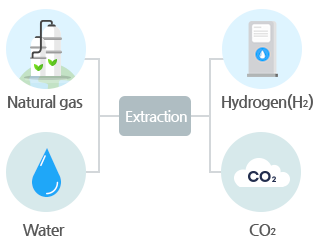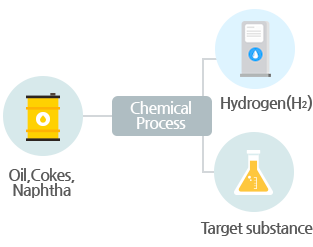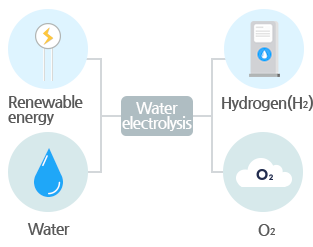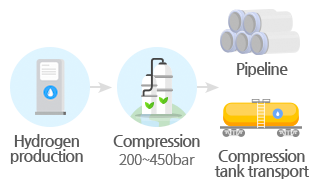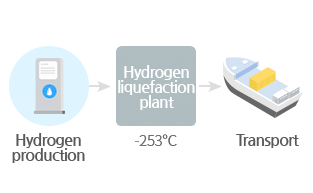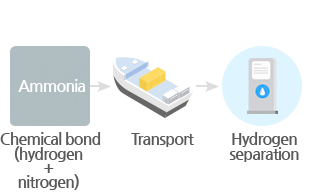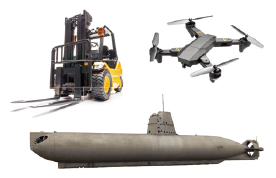KOGAS
Production of Hydrogen Energy
Hydrogen is a secondary energy that can be produced in various ways by using primary energy. Typical methods of producing hydrogen include fossil fuel reforming, byproduct hydrogen utilization, and water electrolysis.
Classification According to Production Method
Move left and right
| Classification | Extraction (Reform) | Utilization of By-product Hydrogen (Process Hydrogen) |
Water Electrolysis |
|---|---|---|---|
| Production principle |
Extracting hydrogen by reacting fossil fuels such as natural gas (methane), LPG, and lignite with steam at high temperature and high pressure | Separating and purifying by-products during the production process of petrochemicals or steel mills | Electrolysis of water to produce hydrogen |
|
|
|
|
|
| Advantage |
|
Low production cost because of no requirement of separate equipment | Eco-friendly due to lack of generation of by-products such as carbon dioxide |
| Limit | Large amount of carbon dioxide |
|
Economically infeasible due to high production cost at present |
Global Hydrogen Production Method
- 18%coal gasification
- 30%Refinery and Chemicals
Byproduct hydrogen - 48~50%natural gas reforming
About 48-50% of the world’s annual hydrogen production of 79 million tons is produced from fossil fuels, e.g., through natural gas reforming, 30% is by-products from oil refining and chemical industries, and 18% is from coal gasification (mainly in China). In the short term, the reforming method will be used, and in the long term, this will be changed to an eco-friendly production method using water electrolysis technology.
Storage and Transportation of Hydrogen Energy
Hydrogen can be stored in a variety of forms, including gaseous, liquid, or compound forms. The mode of transport depends on this mode of storage. It is currently common to compress gaseous hydrogen for storage and transportation, but in the future, pipeline transportation centered on major customers, and liquefied transportation capable of high-density and large-capacity transportation will be used.
How to Store and Transport Hydrogen
Move left and right
| Classification | Gas | Liquid | Compound |
|---|---|---|---|
| Principle | Gaseous hydrogen is compressed and stored in tanks, and supplied through pipelines or compressed tanks. | Hydrogen is cooled to -253°C, liquefied, stored, and transported using tankers or ships. | Hydrogen is converted into methane, ammonia (liquid), etc., or stored in a specific metal and transported using tank trucks or ships. |
|
|
|
|
|
| Feature |
|
|
|
Utilization of Hydrogen Energy
Hydrogen energy is used in various fields such as transportation, power generation, and industry. In particular, the transportation field, in particular hydrogen electric vehicles, has the highest potential for hydrogen utilization, and the success of the hydrogen economy depends on this sector. In the case of power generation, fuel cells are attracting attention as a high-efficiency power generation method in that they can simultaneously produce electricity and heat required for industry and households.
Applications of Hydrogen Energy
Move left and right
| Home Use | Industrial Use | For Transport | For Special Purpose |
|---|---|---|---|
|
|
|
|
|
|
|
|
|

